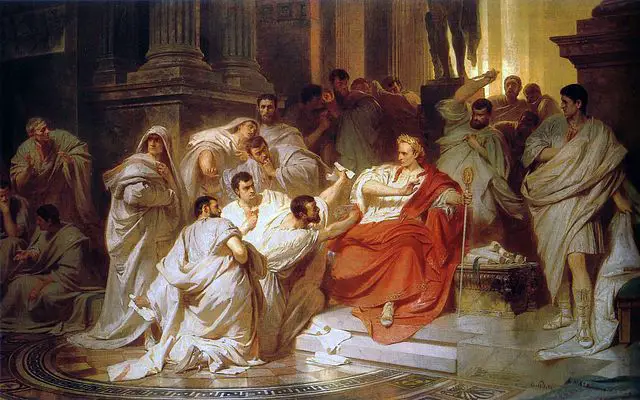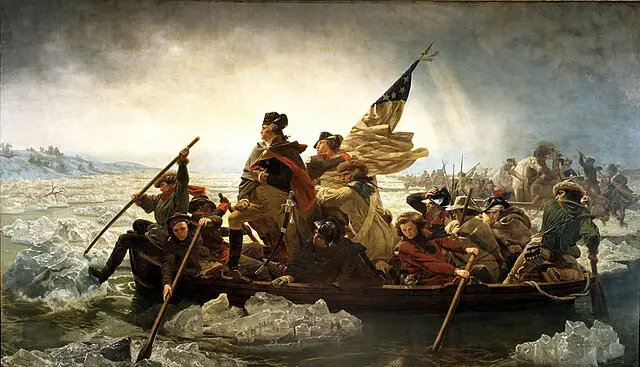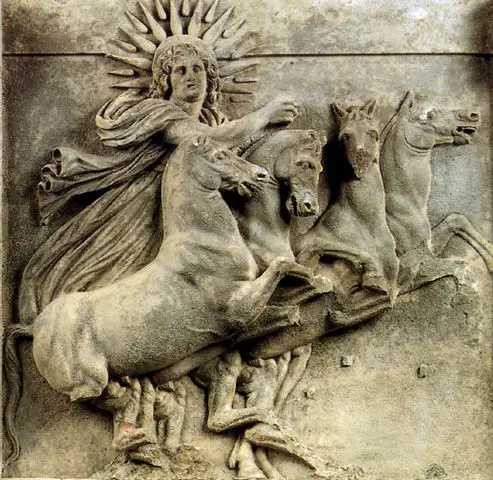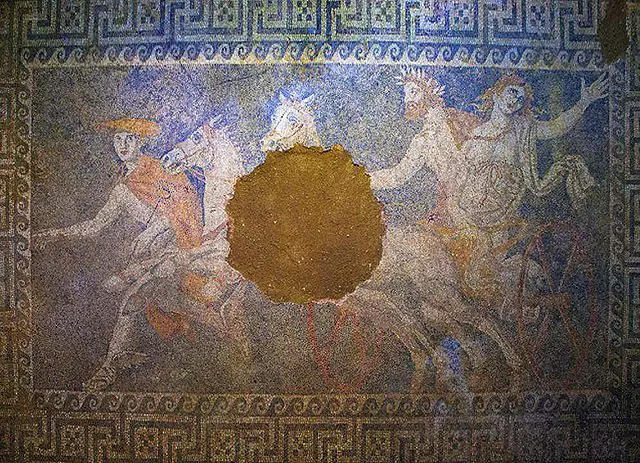
Over 2,000 years ago a series of major events would cause the Roman Republic to fall. These events happened slowly at first but created a lasting effect on the stability of the Roman Republican Government.
There are 10 major events which caused the decline and fall of the Roman Republic.
- The Actions of the Gracchi Brothers (133-122 BC)
- The Military Reforms of Gaius Marius (107 BC)
- The Roman Social War (91-87 BC)
- The Dictatorship of Sulla (82-79 BC)
- The Second Catilinarian Conspiracy (63 BC)
- The Rise of Pompey the Great (82-60 BC)
- The First Triumvirate (60-53 BC)
- Julius Caesar’s And The Civil War (49-45 BC)
- The Rise of Marc Antony (54-31 BC)
- The Battle of Actium and the Rise of Augustus (31 BC)
Each of these events are detailed below in different sections. Within each section I provide the date, how it contributed to the fall of the Roman Republic, and another article that you can read if you want more detail.
This article provides a clear roadmap for why and how the Roman Republic fell over the course of the late Roman Republic.
Here at The History Ace I strive to publish the best history articles on the internet. If at the end you enjoyed this article then consider subscribing to the free newsletter and sharing around the internet.
Without further ado here are the 10 major events that lead to the fall of the Roman Republic.
1.) The Actions Of The Gracchi Brothers (133-122 BC)
| Date | 133-122 BC |
| Impact Level | High |
| Known For | Instituting reforms targeted at lowering the power of the Roman Senate |
| Further Reading | The Gracchi: The 3 Reasons They Are Remembered Today |
One of the major events that led to the downfall of the Roman Republic took place between the dates of 133-122 BC. This was the Gracchi Brothers and their attempted reforms.
Across Rome during 133 BC the poor people of Rome and the veterans of wars were upset with how the Roman Senate was handling the Republic. These people were often forgotten within society and had little place to turn to make a living.
The Senate would provide the people of Rome (populus Romanus) with bread and basic essentials. However all public land was controlled by elite Senatorial families.
This prevented any upwards mobility from happening with Roman society.
Into this mess stepped Tiberius Gracchus. He promised to the Roman people land reform. This was highly favorable and instantly made Tiberius Gracchus a popular politician.
The elite Senatorial families hated this idea and eliminated Tiberius. A decade later Tiberius’s little brother Gaius Gracchus would step into the political arena as well.
Gaius promised land and wealth redistribution. At first it looked like Gaius would accomplish this egalitarian feat but he made one crucial mistake. He also promised Roman citizenship to the Latin allies of Rome around Italy.
This greatly angered the Roman People. They might not be wealthy but at least they were Roman. The Senate seizing this opportunity eliminated Gaius much like his brother.
The Gracchi Brothers however left a precedent. That Roman politics could be shaped by extreme violence. For the rest of the Roman Republic nearly all major political events would become violent.
As such, the Gracchi are one of the 10 major events that led to the fall of the Roman Republic.
2.) The Military Reforms Of Gaius Marius (107 BC)
| Born | 157 BC |
| Died | 13th of January, 86 BC |
| Famous Quote | “The law speaks too softly to be heard amidst the din of arms.” |
| Known For | Reforming the legions of Rome, using assemblies to overturn Roman law, drastic use of violence to impact Roman politics |
| Region of World | Italy, Rome, 1st century BC |
| Further Reading | Gaius Marius: 3 Reasons Why He Is Important To Roman History |
Another one of the 10 major events that led to the fall of the Roman Republic was the military reforms of Gaius Marius.
Gaius Marius was one of Rome’s most celebrated and famous military commanders from 130-86 BC. When he became a military commander the Roman military was disorganized and resembled more of a militia.
Gaius Marius came from a prestigious senatorial family that had connections within the Roman Senate. As such he got several reforms passed. The most important was his military reforms.
The military reforms of Gaius Marius took the disorganized mass of Senatorial loyal troops and instead made them a professional army. Before Marius’s reforms all soldiers had to provide their own military equipment and were only allowed to come from landholding families.
The problem with Rome however was that over the middle republic the urban landless poor swelled in number while the landholding elite disappeared from countless wars.
Marius made it so that Roman landless poor people could join the army and that the Senate/General would provide for their military equipment.
This had a profound impact upon the fall of the late Roman Republic. Now instead of an army being loyal to the Senate of Rome instead it was loyal to the general instead.
As a result all major events of the late Roman Republic involved the Military. The reforms of Marius forever weakened the integrity of the Republican state.
As such, the reforms of Gaius Marius remain one of the 10 major events that led to the fall of the Roman Republic.
3.) The Roman Social War (91-87 BC)
| Event Date | 91-87 BC |
| Impact Level | Medium |
| Why Event Happened | Italian Allies Wanted Roman Citizenship. Rome did not want to grant it |
| Result of Event | Italians became Roman Citizens. |
| Further Reading | 3 Ways The Roman Social War Changed Italian Society Forever |
Another one of the major events that led to the fall of the Roman Republic was the Roman Social War.
This war was fought from 91-87 BC between the Romans and their Italian allies. The war itself was fought over giving Italians Roman citizenship.
The Roman Senate did not want to extend Roman citizenship. The reason was because this would start to unbalance the Roman government which relied upon the delicate balance between the Roman Senate and the Roman People.
If the Italians became Roman citizens then they would be part of the Roman tribes. These Roman tribes could vote out laws the Roman Senate proposed. In essence, if the Italians were given the opportunity to vote it would lead to a rise in politicians who would use the power of popular politics.
And this is exactly what would happen later in the Republic under Julius Caesar.
The Social War was one of the most brutal wars of Roman history. It was fought across Italy in nearly all major towns. However in the end the Italians won and the Romans gave them citizenship.
Because the Roman citizen body was so drastically expanded it was only a matter of time before popularis politicians would wield the crowd to vote down laws. This would directly lead to an increase in violence in Roman politics and a general destabilization of the Republican government.
As a result, the Roman Social War remains one of the major events that led to the fall of the Roman Republic.
4.) The Dictatorship of Sulla (82-79 BC)
| Born | 138 BC |
| Died | 78 BC |
| Famous Quote | “I forgive the many for the sake of the few, the living for the dead” |
| Known For | First Roman in the Republic to seize power by force, won the first large scale Roman civil war. |
| Region of World | Rome, Italy, 1st century BC |
| Further Reading | Sulla: 3 Reasons This Roman Dictator Is Remembered Today |
One of the major events that led to the fall of the Roman Republic was the dictatorship of Sulla.
Sulla was a Roman general from the Social War. Upon the war’s conclusion he was one of the few remaining generals on the Italian continent who still had an army.
He wanted to go east to pursue further glory in the frontier of Rome. However in order to do so he would have to get the approval of the Roman Senate.
At first the Roman Senate gave their approval to send Sulla and his legions east. However, at the last second Sulla’s rival believed he should be given power over the war in the east.
This was the Roman General of Gaius Marius that we previously covered.
Naturally this upset Sulla who believed he had been wronged. In an unexpected turn Sulla would turn his army around and march on Rome 2 times in a row. The first time to remove Gaius Marius from the city.
The second was to make himself dictator.
After making himself dictator of the Roman Republic Sulla went about securing his power. He would prevent the Roman People from vetoing laws as well as drastically increase the size of the Roman Senate.
This made it so that the Roman Senate was loyal to him and the people had no say.
After all of this Sulla began to seize property from Roman citizens to pay for his military campaign and to replenish the Roman treasury.
Sulla directly set the Roman Republic on the road to destruction by setting two precedents. First, was that a Roman general could march on Rome and seize absolute power. Second, once that general had power it was ok to seize private property in the name of the state.
Sulla’s dictatorship directly weakened the integrity of the Republican State and demonstrated that powerful Roman generals were above Roman Law. This paved the road for an Emperor.
As such, Sulla’s dictatorship remains one of the main events that led to the fall of the Roman Republic.
5.) The Second Catilinarian Conspiracy (63 BC)
| Born | 108 BC |
| Died | 62 BC |
| Famous Quote | “To like the same things and to dislike the same things, only this is a strong friendship” |
| Known For | Attempting to overthrow the Roman Republic, One of the most ambitions Romans of the late Roman Republic |
| Region of World | Rome, Italy, 1st century BC |
| Further Reading | Catilinarian Conspiracy: The 3 Things Catiline Was Accused Of |
One of the major events that led to the fall of the Roman Republic was the Second Catilinarian Conspiracy.
Rome had always seen ambitious politicians and generals. However few match the ambition of the upstart politician Lucius Sergius Catilina, known today simply as Catilinia.
In 63 BC Catiline would lose the election for Roman console for the second time. This time he lost to the famous politician and his enemy Cicero.
Most Roman Politicians would return back to their luxurious lifestyle as the Roman elite of society. Catiline however was beyond ambitious.
If he couldn’t win the consulship as a politician he would win it as a rebel invader. Over the election year of 63 BC while Catiline was running for office he was secretly building up an army of around 10,000 people from across the Roman provinces.
This Roman Militia Army was composed of Italian allies, Gauls, veterans from Sulla, and members of the poor people of Rome. To these people Catilina promised riches and power upon seizing the city of Rome and taking over the Senate.
Catiline almost managed to execute his strategy. However at the last moment one of the Catiline conspirators let slip to Cicero the plans.
Cicero immediately took the Roman Senate and denounced Catilina in his now famous Catiline orations, which still survive today.
Catilina’s army would eventually be defeated just north of Rome with Catiline found among the defeated.
However the damage was done. The Catilinarian Conspiracy demonstrated that the Roman people and portions of the Senate were willing to act to overthrow the Republic for their own interests.
As such, the Catilinarian Conspiracy is one of the major events that led to the fall of the Roman Republic.
6.) The Rise of Pompey the Great (82-60 BC)
| Born | 29th of September, 106 BC |
| Died | 28th of September, 48 BC |
| Famous Quote | “More people worship the rising than the setting sun” |
| Known For | Famous 1st century BC roman general, fought against Julius Caesar, Student of sulla |
| Region of World | Rome, Italy, 1st century BC |
| Further Reading | Pompey The Great: The 3 Things He is Known For Today |
Another major event that led to the fall of the Roman Republic was the rise of Pompey the Great.
Pompey the Great served under Sulla during the social war. He would quickly become known across Rome for his military prowess and tactical skill.
Sulla himself greatly admired Pompey and would allow him to have a military Triumph outside Roman tradition. This was unheard of for the time and led to Pompey being called Pompey the Great (magnus).
However, Pompey’s fame would continue well past the age of Sulla. In battle after battle Pompey would be victorious. From this Pompey would gain 3 military triumphs in Rome.
Using this military fame Pompey would also serve 3 consulships. This combined his military prestige with connections within the Roman senate. A dangerous combination that would forever change Republican politics.
It was clear to everyone in the late 50’s BC that Pompey was the most powerful Roman in the Republic. Few would challenge Pompey on proposals in the Senate.
The rise of Pompey the Great demonstrated that one Roman could gain nearly all power in Republican Rome outside of being a dictator. Pompey demonstrated that the Republican form of government in ancient Rome had begun to fail.
As such, the rise of Pompey the Great is one of the major events that led to the fall of the Roman Republic.
7.) The First Triumvirate (60-53 BC)
| Name | The First Triumvirate of Rome |
| Date | 60-53 BC |
| Notable People Involved | Pompey, Crassus, Julius Caesar |
| Brief Description | The First Triumvirate was an informal alliance between the three great generals of Rome. |
| Impact Level | High |
| Further Reading | First Triumvirate: The 3 Ways It Led To The Fall Of Rome |
One of the major events that led to the fall of the Roman Republic was the creation of the unofficial political alliance between Crassus, Pompey, and Julius Caesar in 60 BC.
The First Triumvirate comprised the most powerful military commander and Senator, Pompey, the most wealthy Roman Citizen, Crassus, and an upstart Roman politician who was both loved by the Roman people and the head Roman Religion, Julius Caesar.
This unofficial political alliance gave the First Triumvirate the backing of the military and Senate, the wealth needed to do whatever they needed, and the support of the Roman religion and people.
From 60-53 BC there was no Roman alive that could challenge this political alliance. Further, the Roman Senate who did not follow Pompey could not do anything to stop the First Triumvirate.
What happened was that The First Triumvirate was above all Roman Law. Each of the 3 members could do what they wished with the Roman Republic so long as it did not conflict with the other 2 members.
The First Triumvirate was the first instance of a political entity in Rome that was above the law and loved by the people. In essence, this Triumvirate set the precedent of an Emperor.
As such, The First Triumvirate was one of the major events that led to the fall of the Roman Republic.
8.) Julius Caesar and The Civil War (49-45 BC)
| Born | 12th of July, 100 BC |
| Died | 15th of March, 44 BC |
| Famous Quote | “I came, I saw, I conquered” |
| Known For | Roman General who marched on Rome and overthrew the Republic, historian, one of the most influential people in history |
| Region of World | Rome, Italy, 1st century BC |
| Further Reading | Julius Caesar: The 3 Reasons He Is Famous Today |
One of the major events that led to the fall of the Roman Republic was the Roman Civil war that was started by Julius Caesar.
In 49 BC Julius Caesar crossed the Rubicon, a symbolic river that divided Roman Italy from its northern provinces. This was a direct declaration of war by Julius Caesar against the Roman Republic.
The reason that Julius Caesar crossed the Rubicon river is debated by historians. However we know that Caesar wanted to have both a military Triumph and hold the Roman consulship.
Having both of these at the same time was forbidden in the Roman constitution as it could lead to a symbolic power takeover. Having the Republic led by a standing general would allow the consul to create and enforce his own laws.
Julius Caesar was presented with the option of having either a triumph or holding the consulship but not both.
Caesar took the third option set forth by Sulla nearly a half century earlier; he marched on Rome.
This caught the Senate by surprise. Caesar was declared an enemy of the state and Pompey was tasked with protecting Rome.
After four years of hard fighting Julius Caesar would eventually win and proclaim himself dictator for life. This forever changed the Roman republic and led directly to its downfall.
Now one Roman held complete control over all Roman power.
As such, Julius Caesar and the civil war is one of the major events that led directly to the fall of Rome.
9.) The Rise of Marc Antony (54-31 BC)
| Born | 14th of January, 83 BC |
| Died | 1st of August, 30 BC |
| Famous Quote | “My heart is in the coffin there with Caesar” |
| Known For | Fighting a war against Octavian for control of the Roman World, member of Second Triumvirate, governor of Egypt |
| Region of World | Rome, Italy, 1st century BC |
| Further Reading | Mark Antony: His 3 Greatest Accomplishments In Ancient Rome |
One of the major events that led to the fall of the Roman Republic was the rise of Marc Antony.
Mark Antony served under Julius Caesar in his battles in Gaul. Here Antony would learn much about the nature of Roman battlefield tactics.
During Caesar’s civil war with Pompey Antony would become one of Caesar’s most trusted commanders. Ancient sources detail Marc Antony as one of, if not the, most competent commander in Caesar’s force.
After the Roman Civil war both Caesar and Antony would be elected to serve as consuls in 44 BC. Here Caesar would leave to fight Parthia in the east while Antony would be left to govern all of Rome in his stead.
Caesar would never make it to Parthia. Antony would assume Caesar’s power and become for a brief period of time the most powerful person in the entire Republic.
At his height of power he controlled all Roman land from modern France and Britain down to Syria. The only Roman land he did not control was Spain and Northern Africa.
Marc Antony would come a hair away from being the first Roman Emperor. If it was not for the actions of Caesar’s heir Octavian then this list would end here, however there is one more major event that led to the fall of the Rome Republic.
The Battle of Actium and the rise of Augustus.
10.) The Battle Of Actium And The Rise Of Augustus
| Event Date | 2nd of September, 31 BC |
| Notable Figures Involved | Octavian (Augustus) and Mark Antony/Cleopatra |
| Region of World | Western Greece |
| Further Reading | Augustus: 3 Greatest Accomplishments Of Rome’s First Emperor and Battle of Actium: The 3 Reasons It Is Significant To World History |
The last major event that led to the fall of the Roman Republic was the Battle of Actium.
The Battle of Actium took place on the 2nd of September, 31 BC between the forces of Octavian and Marc Antony/Cleopatra.
This naval battle was the result of nearly a year of constant fighting. It all came to the climax in the Battle of Actium.
Marc Antony had been trapped in western Greece with his army and fleet. Octavian was convinced by his officers to attack. In a decisive blow Octavian destroyed nearly all of Marc Antony’s fleet and army.
This event marked the end of the Roman Republic. Before the battle there were only two powers in Rome, Octavian and Marc Antony.
With the defeat of Marc Antony there was nobody left to stand in the way of Octavian becoming Role’s sole ruler. Over the next 4 years Octavian would consolidate power across the provinces and finally be awarded the new name of Augustus, the first Roman Emperor.
As such, the Battle of Actium was the last major event that led to the fall of the Roman Republic.
Conclusion
There you have it; an entire article that goes over the 10 major events that led to the fall of the Roman Republic.
The late Roman Republic remains a fascinating time. I wrote my entire masters thesis (125 pages) on one word in Cicero’s vocabulary populus Romanus. There is so much left to understand about this one century time frame in world history.
I hope you enjoyed this article. Here at The History Ace I strive to publish the best history articles on the internet. Feel free to sign up for the free newsletter to remain up to date on all things history.
Further, you can check out some of the other articles below.
-
How The American Revolution Changed The World

Here is how the American Revolution changed the world. Many people are not aware of just how important this event actually was.
-
Why The Roman People Loved Chariot Racing

Why did the Roman people love chariot racing? Well it all comes down to these 3 reasons.
-
The Design and Color of Roman Chariots

What was the design and color of Roman Chariots? Were they faster or slower then normal chariots? Well here is everything!
Sincerely,
Nick